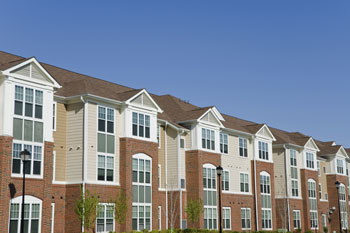What Are the Benefits of Managed WiFi? | DojoNetworks

Managing a multi-tenant property can be challenging, and one area where you cannot fail is providing reliable internet services. When the internet service is lagging, your on-site team can quickly be overwhelmed with tenant complaints, while also trying to rectify the issue. When the burden of managing the internet service falls squarely on your shoulders, it consumes valuable time and resources that could be better allocated elsewhere. Unreliable or slow internet access not only affects tenant satisfaction but also puts strain on the property owner's ability to efficiently manage the property and retain tenants.
Fortunately, a properly designed, installed, and supported managed WiFi network can alleviate the pain, increase resident satisfaction, increase your property value, and boost operating income. How?
Managed WiFi setup, maintenance, and support are handled by the WiFi vendor, ensuring consistent performance and security standards across the property and relieving the on-site management team of their internet support duties.
Tenants and potential renters seek not just amenities but also convenience. By offering reliable, property-wide WiFi services, your community will have a competitive advantage over neighboring properties. Vacancies will be minimal, and you may be able to charge premium rental rates while reducing labor costs.
 The Hidden Costs of Unmanaged WiFi in Multi-Tenant Properties
The Hidden Costs of Unmanaged WiFi in Multi-Tenant Properties
The hidden costs of unmanaged WiFi in multi-tenant properties extend beyond the initial setup and equipment expenses. Property owners must consider the long-term implications of poor internet service quality, including:
- Lost Productivity and Tenant Dissatisfaction: Slow or unreliable internet can significantly impact tenant productivity and satisfaction, potentially leading to revenue loss through tenant churn.
- IT Staff Time and Expertise: Property owners and managers without dedicated IT staff bear the burden of managing network issues, troubleshooting problems, and maintaining equipment, diverting resources from core operations.
- Security Risks and Compliance Issues: Unmanaged networks pose increased security vulnerabilities and potential non-compliance with data privacy regulations, exposing properties to costly breaches and legal consequences.
- Hidden Equipment Costs: Ongoing expenses for purchasing, maintaining, and replacing outdated network equipment accumulate over time, contributing to unforeseen financial burdens for property owners.
- Non-Commercial Grade Service: DojoNetworks’ Managed WIFI service is a commercial grade service that is very different from a Residential service or Bulk Modem. Commercial grade service includes a commercial fiber circuit and 24x7 vendor monitoring and support. A commercial grade fiber circuit means up-time of 99%, few or no service outages, and maintenance on the circuit is usually performed in the timeframe of 12:00-5:00 AM. In contrast, Residential Grade service allows for repairs and maintenance at any time and without advance notice.
 Financial Benefits of Implementing Managed WiFi
Financial Benefits of Implementing Managed WiFi
On the flip side, implementing managed WiFi can bring several financial benefits to property owners, especially in terms of cost savings and revenue generation. Here are some key financial benefits:
- Cost Savings and Predictable Billing: Managed WiFi providers offer bundled solutions that streamline billing, reducing overall internet costs and providing predictable monthly expenses.
- Reduced IT Burden and Staff Costs: Outsourcing network management to managed WiFi providers frees up property management resources, reducing IT labor costs and allowing focus on other business activities.
- Improved Network Performance and Reliability: Managed service providers proactively monitor and optimize networks, ensuring consistent performance and minimizing downtime.
- Enhanced Security and Compliance: Many managed service providers (MSP) offer security features like firewalls, intrusion detection, and guest network management. These services reduce security risks and ensure compliance with data privacy regulations, potentially saving costs associated with data breaches.
- Scalability and Future-Proofing: A well-designed managed WiFi solution is scalable, allowing for easy upgrades and expansion as tenant needs evolve—a potential source of increased revenue—and minimizing the need for costly infrastructure overhauls in the future.
 Calculating the ROI of Managed WiFi
Calculating the ROI of Managed WiFi
To calculate the potential return on investment (ROI) from managed WiFi, we need to consider several factors, including cost savings from reduced IT burden, equipment maintenance, and potential tenant retention improvements. Here's a framework to guide the calculation:
Initial Investment
- Start by calculating the initial investment required for implementing managed WiFi. This includes the cost of hardware, software, installation, and any other associated expenses.
Monthly Service Cost
- Determine the monthly cost of the managed WiFi service. This typically includes ongoing support, monitoring, and maintenance provided by the service provider.
Cost Savings from Reduced IT Burden
- Project the reduction in IT workload and associated cost savings after switching to managed WiFi.
Equipment Maintenance Savings
- Estimate the cost of maintaining and upgrading WiFi equipment over time (e.g., access points, switches, controllers).
- Consider the savings achieved by outsourcing equipment maintenance and upgrades to the managed service provider.
Potential Tenant Retention Improvements
- Assess the positive monetary impact that reliable and high-performance WiFi will have on resident satisfaction and retention rates.
- Estimate the monetary benefits of increased tenant retention—including the possibility of higher rental fees and internet service upsells—resulting from reliable, high-speed, property-wide internet access.
Calculate ROI
- Compare the estimated cost savings against the costs of the managed WiFi service to determine the potential return on investment.
Beyond the Numbers: The Value of Managed WiFi
Managed WiFi—when properly designed, implemented, and supported by an experienced vendor like DojoNetworks—enhances the overall resident experience and makes life much easier for the on-site property management team. Offering a robust and hassle-free WiFi service reflects positively on the property owner’s brand, enhancing its reputation among current and prospective residents. Property owners enjoy peace of mind knowing that their WiFi infrastructure is professionally managed.
Conclusion
Implementing managed WiFi at multi-tenant properties can boost property value, lower labor and maintenance costs, create revenue streams, reduce liability, and improve tenant satisfaction and retention. While the financial ROI of managed WiFi can be calculated through cost savings and potential revenue gains, it's essential to recognize the qualitative benefits that contribute to tenant satisfaction: brand reputation and peace of mind for property owners, which are equally valuable but harder to quantify in financial terms.
To calculate the potential financial impact of implementing managed WiFi for your multi-tenant property, check out DojoNetwork's Net Operating Income (NOI) calculator here: Rental ROI Profit Calculator | DojoNetworks®





